Good morning.
Initially, I’d planned to release a newsletter that unpacks some of the Urban vs Rural discourse that came up post BC’s election but, as you might remember, some big news happened the week following the BC election (no, not just the Wendy’s Krabby Patty) and American politics kind of just took over all discourse.
In the aftermath of the “is democracy just dead now” result, friend of the newsletter and amateur skateboarder
concluded his own digestion of the news with a simple and heartfelt call to action: “Act locally.”I’d love to say this immediately pulled me out of my American politics doomscroll but the truth is that, in the landslide of media the last couple of weeks, his newsletter ended up filed somewhere in the back of my brain while I continued to mainline all of the worst case economic scenarios, the fall of Western democracy, and the rise of a reality star fascist.
But, eventually, like all bad feelings - most of it passed and I revisited Andrew’s words and spent some time reflecting on our community.
“Act locally” in the overwhelming noise of the *gestures wildly* right now, has since become a bit of a life raft - a small antidote to the despair in my chest, and a reminder that when everything going on feels a bit out of reach, our communities are not.
So here are some thoughts on acting locally.
Politics as a vehicle for change.
I was out for coffee with our realtor (who has since become a good friend after the whole house buying thing) last week. This newsletter came up - Devon is a reader apparently (shout out to Devon Budd Realtor #notsponsored). Half-jokingly, he asked when my bid for City Council is starting - which is somehow not the first time I’ve been asked that in regards to this newsletter.
In the past, I’ve struggled to articulate exactly why this newsletter is not a secret soft launch for Darrin Rigo 2026, 2030, etc but I think today’s topic can hopefully offer some solace that you won’t see me putting lawn signs down the Ospika median any time soon (or, ideally, ever).
The last municipal election was counted October 15th, 2022 - just over 2 years ago.
Roughly 15,000 of Prince George’s eligible 60,000 residents, a whopping ~25%, showed up to exercise one of the supposed greatest levers of power they have in their community.
6092, or about 10%, voted for our Mayor.
The largest share of votes went to Councillor Brian Skakun, receiving the support of 9370 residents, or 15% of Prince George’s eligible voters.
Beyond that, we elected a majority incumbent council - just 3 newcomers broke into the scene with folks like Skakun hitting on his 22nd year of service, and Frizzel hitting year 16.
Let’s be fair for a moment and mention that municipal elections are not known for massive turnout anywhere in Canada, especially it would seem in B.C. which boasted a 30% average in 2022 compared to Ontario’s average of 38%. Looking at comparator cities like Lethbridge, we’re pretty much bang on with their 27% turnout in 2022 but significantly lagging behind Vancouver’s near 36% turnout.
I hesitate to be THIS cynical but deep down, I have to ask: if 75% of the city opted out of voting in the last election, what does that say about their faith in local politics to invoke meaningful change?
The Bogotá Ciclovía Movement
Let me take a second to tell you a quick story (and I’m going to speed through it but if you’re interested in it, you should read the full story as it’s fascinating):
In the early 1970’s, a very-ahead-of-his time urban planner (and cycling enthusiast) in Bogotá, Columbia was growing frustrated with the car-centric nature of the streets of his beloved capital City.
Jaime Ortiz Mariño (the planner) eventually teamed up with Eduardo Díaz (local activist) and spent months gathering data and support for an idea they eventually would call Bogotá Ciclovía - the shutting down of a few key streets for 6 hours every Sunday so families could bring their kids out into the streets to cycle, or walk without fear of speeding vehicles.
Summarizing the next decade is to say that the trial run of closing a handful of streets slowly expanded and grew into shutting down most of their downtown from 9am-3pm every Sunday.
It became a cultural event that brought out street vendors, musicians, and is now a hallmark of life in Bogotá.
The idea that Mariño and Díaz initially proposed was faced with fierce backlash from City officials, and local businesses who saw the shutting down of streets as bad for businesses and would only upset locals who were trying to complete Sunday errands.
It took years of fierce advocacy to move this idea from stupid idea to beloved cultural tradition.
Before we move on, a couple other examples I love almost as much as Bogotá Ciclovía if you’re interested in these grassroots movements:
How does this all connect to Prince George?
If you’re reading this newsletter, you probably know the beating drum in my chest is to refocus this City away from its endless sprawling suburbs into densified housing, and a walkable downtown, and most broadly, to help redirect the “but it’s the homeless people ruining downtown!!” mentality to an empathy-centric, and more nuanced understanding of “the problem” with downtown PG.
The success of Bogotá’s Ciclovía wasn’t just about cycling—it was about showing people that small, consistent changes can transform a city’s culture. Prince George has its own examples of this, like the growth of the Saturday Farmers’ Market.
What used to be a few booths and a run down building beside The Keg now regularly shuts a piece of Quebec St. and stretches all the way down 3rd to Queensway.
“But we’re a winter city!”
We also have proof of concept from last year that shutting down the little piece of 7th in front of City Hall in the winter can provide an incredible backdrop for a weekend festival:
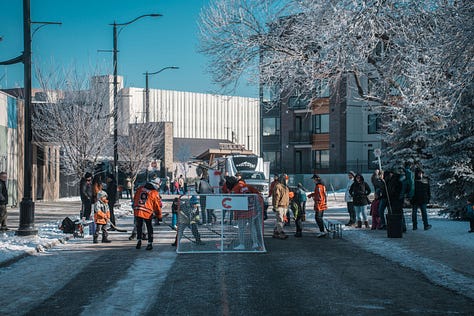
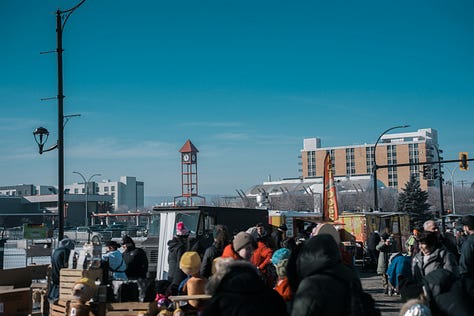
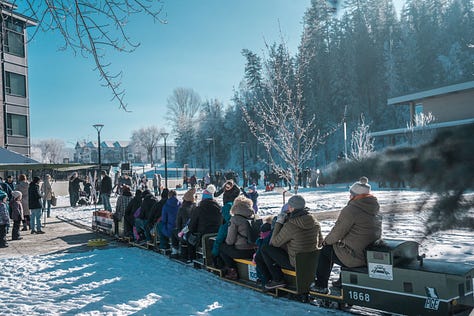
What this tells me is that the urbanist movement in Prince George is alive and well, I just don’t think people know it.
I look at this as a very literal proof of concept that the 75% of voters who didn’t show up to the last election might show up if you can show them what our city COULD be if we weren’t so fixated on the status quo.
My last point: a very rough roadmap.
The problem PG appears to be stuck in is that progressive candidates with strong urbanist and deeply progressive values rarely show up in the municipal election circuit and, truthfully, I can kind of understand why - the voters don’t really seem to turn out for them when they do.
That happens enough times and it has all the makings of a classic chicken or the egg - the urbanist, progressive candidates don’t run because no one votes for them, and the urbanist progressive voters likely aren’t motivated to turn out because the most successful candidates are largely status quo.
We’re 2 years out from the next election and for the first time in my life, I feel like might not be scrambling to do my homework the night before it’s due. There is time to build a great little community, to organize and to tie it all back to the original these of “act locally.”
I’m not exactly sure what that looks like in full and this is where the roadmap starts to look a little bit more like this:
All I can do is to tell you this is what I’m focusing on:
Writing this newsletter and trying to get more people on board with the densified PG and walkable downtown mission.
Chatting more with friends about good urban planning and the invisible forces that influence our perception of downtown.
Yelling at (kindly) people who think homelessness is the only reason our downtown is struggling.
Identifying friends/colleagues who I think could be interested in running for politics with progressive, urbanist values and helping them wrap their heads around it NOW as opposed to the 11th hour.
Reading more books, listening to more podcasts about urbanism.
Anyways - that’s all I got. This was easily the hardest newsletter to write only because I really did not want to come across as anything that resembles an “expert”, or sound too self-congratulatory on whatever this newsletter is.
I especially don’t want to come across as someone who thinks his silly newsletter is going to move mountains and make kings - the truth is that I never expected this newsletter to be anything close to what it is and now having a decent readership, I feel compelled to use a bit of that audience and attention and point it at something meaningful.
So hopefully this whole thing comes across the way I meant it to and if you are interested in having a more thoughtful chat about local politics, my DMs are always open.
Thanks for reading.




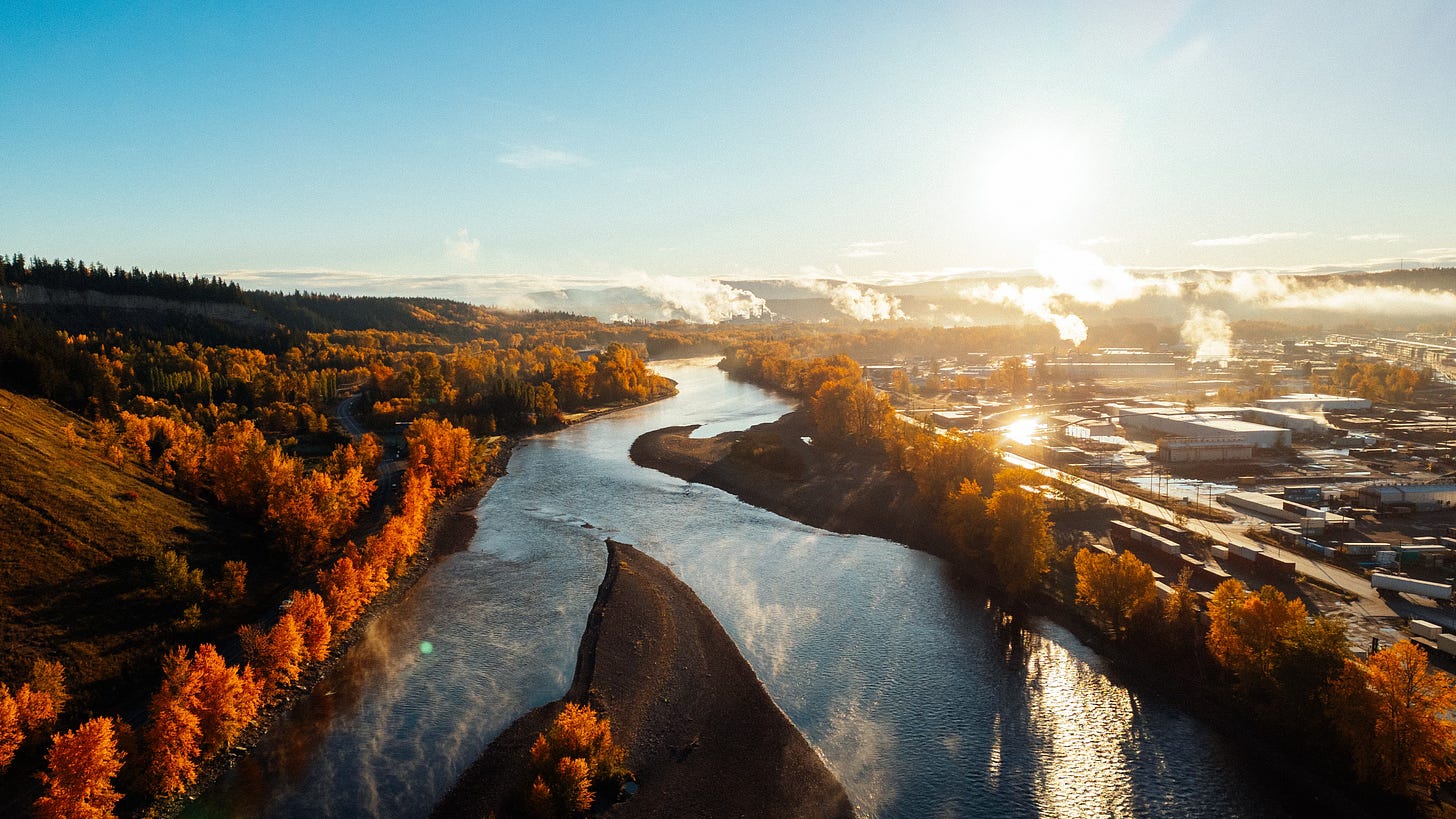

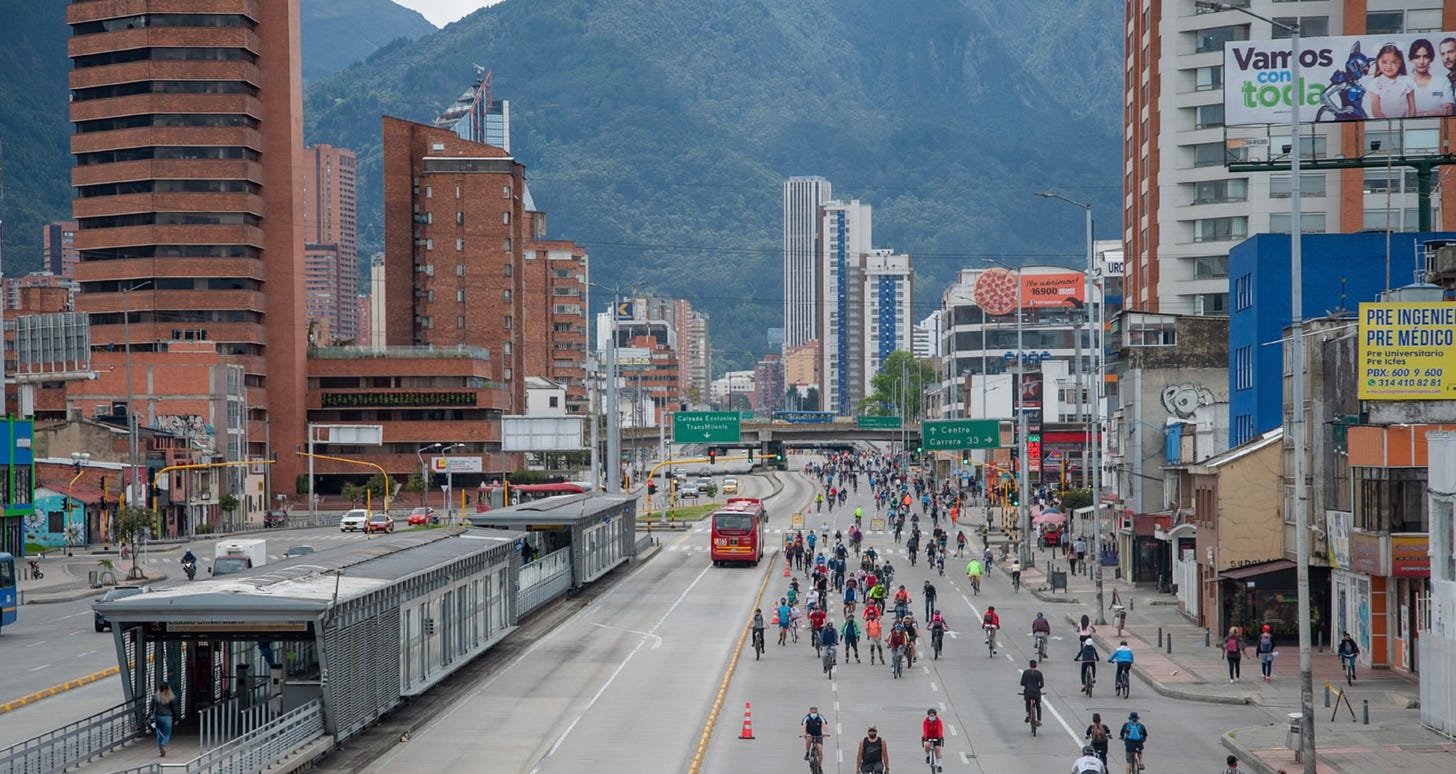
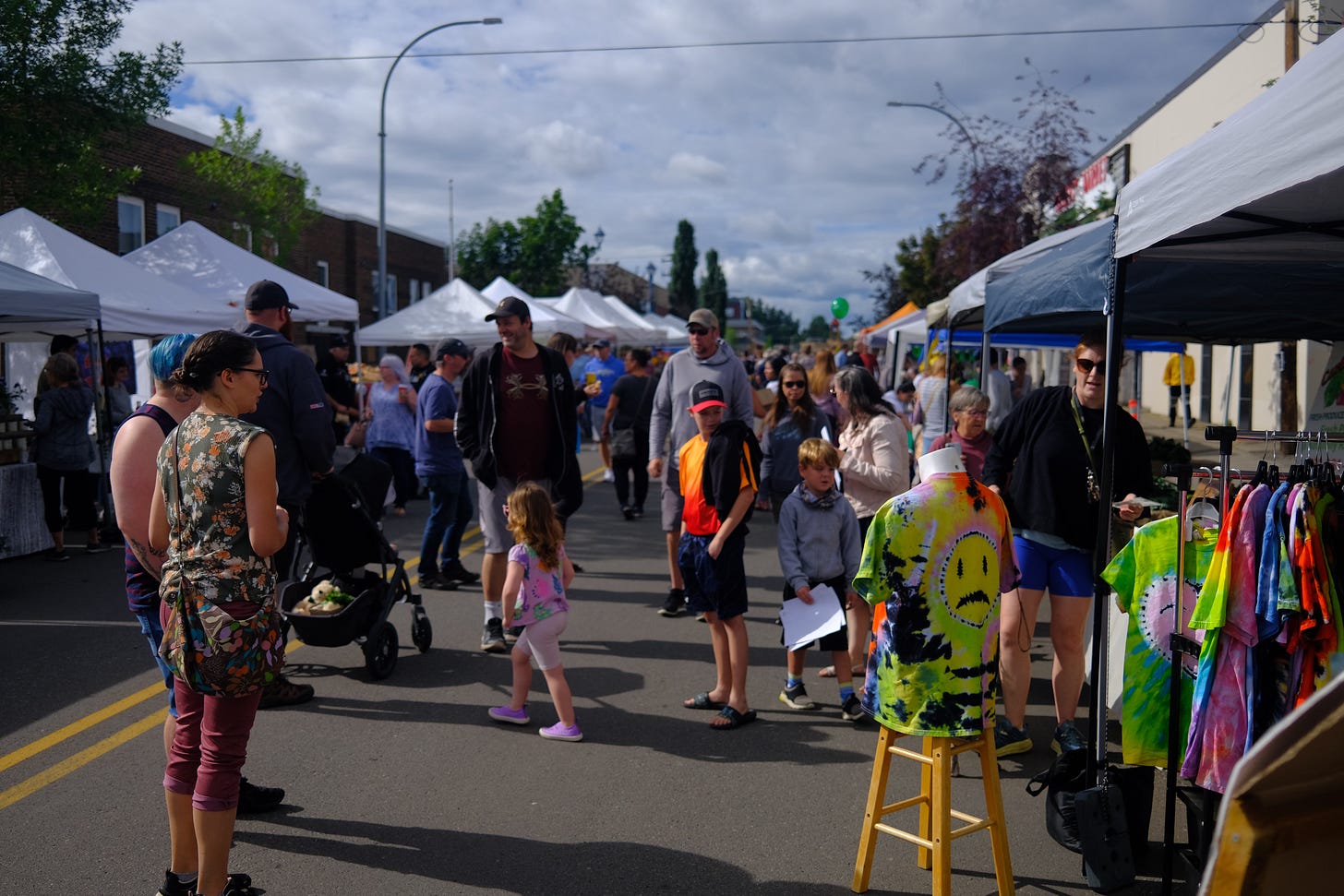

I love this, Darrin. Thinking locally really helps people to concentrate on the, "But what can I actually DO?" questions that big issues seem to generate.
One theory I have about why many candidates with great ideas struggle to get attention is that issues like these get lost in other priorities, like jobs and affordability. If progressive or urban-planning candidates want to attract notice, it could be helpful for them to help people understand how their ideas relate to day-to-day concerns, AND, how their ideas are not mutually exclusive from other issues that people worry about.
People want it all. They want better focus on density, AND they want to keep the option to have a house with a yard. They want better transit, AND they want the option to drive a car if they choose to or need to. I tend to see candidates focus on one or the other. I of course understand that we can't always have it all. But I also feel that progressive candidates might be more successful if they could convince people that they could have *some* of it all. Does that make sense? Like in Bogota, they didn't shut down all of the streets, and they didn't shut down some streets every day.
It's an uphill climb (literally, if you're going to the Hart) to convince people to budge on things they hold dear, but if you can convince people that what's good for downtown is also good for the Hart, there may be better success.
The sprawl is real. I think you are right on many points here Darren, particularly around the status quo at our local government and a lack of progressive candidates willing to run. Let’s bring Brent Toderian to PG for a visioning session for our downtown.